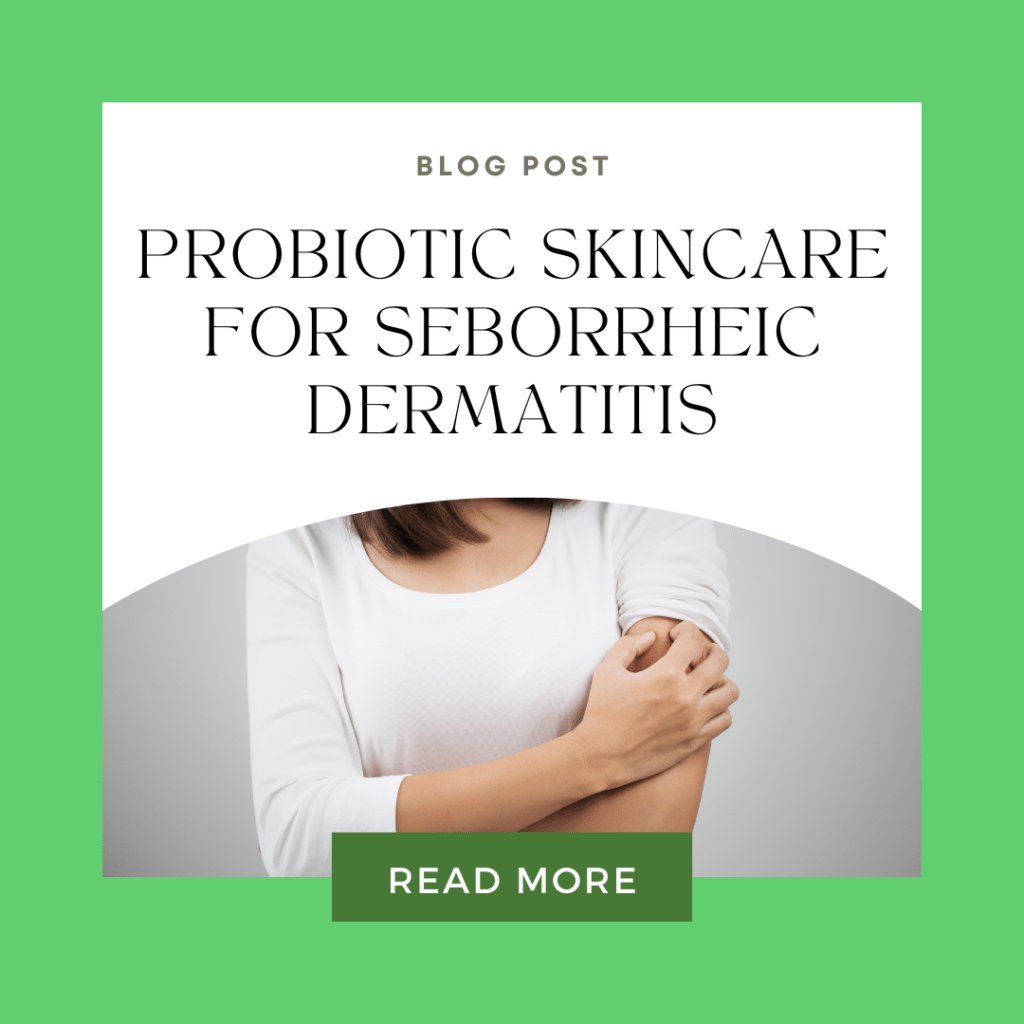Seborrheic dermatitis is more than just an annoying skin condition—it can significantly impact your confidence and comfort. While prescription treatments often come with side effects, probiotic skincare offers a natural, gentler approach. Let’s explore how probiotics can benefit those dealing with seborrheic dermatitis and why natural probiotic soaps might be your skin’s new best friend.
What Is Seborrheic Dermatitis?
Seborrheic dermatitis is a chronic skin condition characterized by:
- Symptoms: Redness, flaking, itching, and greasy patches, often on the scalp, face, and other oil-prone areas.
- Cause: Overgrowth of Malassezia yeast, an imbalance in the skin’s microbiome, and inflammation.
While it isn’t contagious, it can be persistent and difficult to manage. Conventional treatments often include antifungal creams, steroids, or medicated shampoos, which may only provide temporary relief and come with potential side effects.
How Probiotics Can Help Seborrheic Dermatitis
Probiotics—live, beneficial bacteria—aren’t just for gut health. When applied topically, they can restore balance to the skin’s microbiome and reduce inflammation.
Here’s how they work:
- Restoring Microbial Balance
- Probiotics help rebalance the skin’s microbiome by encouraging the growth of good bacteria that naturally keep yeast, like Malassezia, in check.
- Reducing Inflammation
- Certain probiotic strains produce anti-inflammatory compounds that soothe redness, irritation, and itching—common symptoms of seborrheic dermatitis.
- Strengthening the Skin Barrier
- Probiotics support the skin’s protective barrier, helping it retain moisture and defend against environmental triggers that worsen symptoms.
- Natural Antifungal Properties
- Some probiotic strains release substances that naturally inhibit yeast overgrowth, reducing flare-ups without the need for harsh chemicals.
The Role of Probiotic Natural Soaps
Using a natural soap infused with probiotics can be a game-changer for managing seborrheic dermatitis. Here’s why:
- Gentle Cleansing
- Many conventional soaps strip the skin of natural oils, leading to irritation. Natural probiotic soaps cleanse gently without disrupting your skin’s delicate balance.
- Infused with Skin-Loving Ingredients
- Ingredients like coconut oil, shea butter, and aloe vera in natural soaps provide hydration and nourishment, alleviating dryness and flaking.
- Delivering Probiotic Benefits Directly to the Skin
- By incorporating probiotics into your cleansing routine, you ensure your skin gets consistent exposure to beneficial bacteria, promoting a healthier microbiome.
- No Harsh Chemicals
- Natural probiotic soaps are free of sulfates, parabens, and artificial fragrances that can exacerbate symptoms of seborrheic dermatitis.
Why Probiotic Skincare Is Better Than Prescriptions
While prescription treatments for seborrheic dermatitis can be effective, they’re not always ideal for long-term use. Here’s how probiotic skincare offers a safer, more sustainable alternative:
- Fewer Side Effects
- Steroid creams can thin the skin, and antifungals may cause irritation or sensitivity. Probiotics provide gentle relief without these risks.
- Addresses the Root Cause
- Rather than merely suppressing symptoms, probiotic skincare works to rebalance the microbiome, targeting one of the underlying causes of seborrheic dermatitis.
- Holistic and Natural
- Probiotic skincare aligns with a holistic approach to health, avoiding synthetic chemicals and supporting your skin’s natural healing processes.
- Environmentally Friendly
- Natural probiotic products are often eco-conscious, using biodegradable ingredients and sustainable packaging—better for you and the planet.
- Suitable for Sensitive Skin
- Prescription treatments can be harsh, especially for those with sensitive skin. Probiotic skincare is mild and nurturing, making it suitable for daily use.
How to Incorporate Probiotic Skincare Into Your Routine
- Cleanse: Start with a natural probiotic soap to gently cleanse the skin while delivering beneficial bacteria.
- Moisturize: Follow up with a probiotic-infused moisturizer to lock in hydration and soothe irritation.
- Stay Consistent: Consistency is key to seeing long-term benefits. Incorporate probiotic products into your daily skincare routine.
Final Thoughts
Seborrheic dermatitis can be challenging, but probiotic skincare offers a natural, effective way to manage symptoms. By restoring balance to your skin’s microbiome and supporting its natural defenses, probiotics not only address the root cause but also promote healthier, happier skin overall.
If you’re tired of prescription creams and their side effects, it might be time to make the switch to probiotics. Your skin—and the environment—will thank you.
Have you tried probiotic skincare for seborrheic dermatitis? Share your experiences or favorite products in the comments below!




